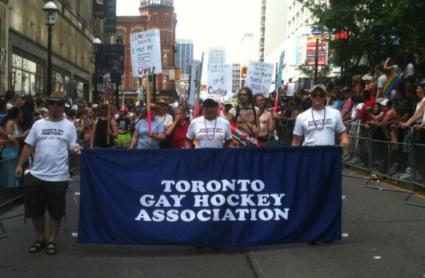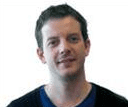Some words are both powerful and hurtful, which is why public figures should be punished if they use them.
This is the message the Toronto Gay Hockey Association (TGHA) wants to send to the NHL and all professional sports teams.
The TGHA has called on the NHL to enforce a ban on homophobia following a Sept 26 on-ice incident in which Philadelphia Flyers forward Wayne Simmonds called Sean Avery, a player for the New York Rangers and also an outspoken advocate for gay rights, a “fucking faggot.”
A Sept 28 TGHA press release states: “The NHL and its member teams must promote a fair and inclusive environment for all fans regardless of race, gender or sexual orientation. We challenge the NHL to adopt inclusive policies that protect homosexual players in the league who are afraid of coming out of the closet.”
Hockey and professional sports are one of the only remaining areas where homophobia is still tolerated in Canada, says Bryan Frois, TGHA director of communications.
“A lot of our veteran players in the league had to form this league because they experienced homophobia in a lot of the straight leagues in Toronto,” says Frois, noting that TGHA was formed in 1994. “Homophobic comments are still prevalent. Not enough has been done to eliminate them from the game or punish those who make comments.”
Simmonds, who is black, recently made headlines after he was the target of a racial attack when a spectator threw a banana peel on the ice during a pre-season game in London, Ontario. The 26-year-old spectator was later identified and charged with engaging in a prohibited activity under the provincial Trespass to Property Act.
Simmonds told media on Sept 26 that his homophobic comment was made “in the heat of the battle,” and he doesn’t think it crossed a line.
Frois disagrees and wants the NHL to fine or suspend Simmonds.
Frois says the Toronto Marlies professional hockey team has told him they will team up with the TGHA to host an event on Dec 10. They will also film a public service announcement to tackle homophobia in the sport.
But University of Toronto professor Caroline Fusco says it will take more than a public service announcement to rid hockey of homophobia.
“There are players that are coming out, which is fantastic and wonderful, but I don’t think that will stop the slurs,” says Fusco, who teaches in the Faculty of Physical Education and Health. “It’s going to continue. When we live in an environment where our politicians do not speak out and do not celebrate LGBT celebrations, it creates a context in which this discrimination is allowed to continue.”
Fusco says research shows homophobia is common in sport because it helps players feel more comfortable in the athletic team’s same-sex environment.
“All men’s sport and all women’s sport is very homosocial,” she says. “You celebrate with the same sex, you hug, you jump on — there’s all sorts of things that maintain that homosocial bond. Homophobia keeps that from slipping into homoeroticism. It’s the line that maintains the homosocial versus the homoerotic.”
Despite this, Fusco says it’s important to keep the pressure on.
“I commend people like [Sean Avery] who know and who have heard in the locker room, time and time again, these sexist and homophobic slurs. I commend the work he does to address these issues,” she says. “People tend to forgive this kind of behaviour, and it’s really despicable.”


 Why you can trust Xtra
Why you can trust Xtra


